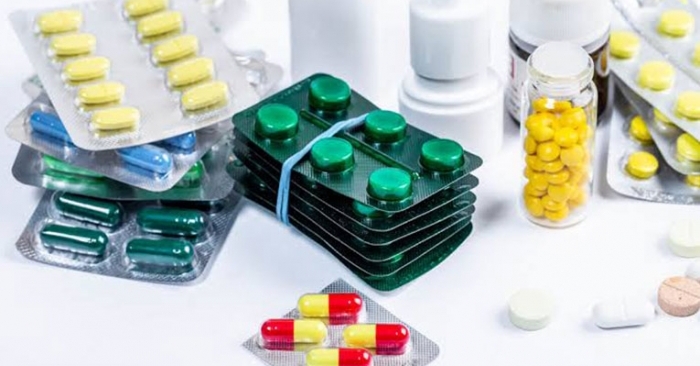India caught in middle of global pharma supply chain that starts from China & delivers drugs to world
April 7, 2020: After the telephonic conversation between the US president Donald Trump and prime minister Narendra Modi on Saturday, India on Monday decided to partially permit the export of hydroxychloroquine, an anti-malaria drug vital to fight the Covid-19 pandemic along with many other medicines including paracetamol.

April 7, 2020: After the telephonic conversation between the US president Donald Trump and prime minister Narendra Modi on Saturday, India on Monday decided to partially permit the export of hydroxychloroquine, an anti-malaria drug vital to fight the Covid-19 pandemic along with many other medicines including paracetamol.
The US president's call was followed by requests from Australia, France, Germany, UK, Brazil, Israel and Bahrain for India to open its drug exports to these countries. The requests and calls reveal how India is positioned in the global pharma supply chain and how important the Indian pharma industry to the world.
This is only one part of the story, as the Indian pharma is dependent on Chinese APIs and India is also in desperate need of these medicines due to increasing infection cases inside the country.
DHL Resilience360, the supply chain risk management platform of the global logistics company, released a report on how China, India, US, Europe and rest of the world is placed inside the global pharma supply chain. The report titled "Covid-19: Impact on API production and global pharmaceutical supply chains," raises concerns over the Indian ban on drug exports came on March 3, Chinese lockdown affecting API manufacturing and US FDA reports on the scarcity of drugs, which also kept the specificity of the medicines confidential.
India
"India exports about 26 percent of the European formulations in the generic drug market, while it accounted for 24 percent of the generic drug imports to the US in 2018. At the moment, there are around 700 drug-making facilities in India that are reportedly licensed to export to the US pharmaceutical firms, " says the report.
To tackle possible domestic shortages of medicines as Covid-19 infection cases continue to rise in the country, India banned the export of 26 pharmaceutical ingredients as well as formulations that are used in the making of generic drugs, such as paracetamol and antibiotics.
On April 8, 2020, Indian Transport and Logistics News is organising a webinar on the topic "Finding cargo capacity and delivering critical pharma supplies in a pandemic.
Webinar by #ITLN: Finding #cargo capacity and delivering critical #pharma supplies in a pandemic@ITLNLive @CSCIndia_PvtLtd #Teva @CDSCO_INDIA_INF#Pentafreight #logistics #supplychain #aviation #Transportation #covid19 #webinar #AirCargoLiftsLifehttps://t.co/cE0JlQUHUM
— ITLN Live (@ITLNLive) April 4, 2020
Pharma and air cargo
Medicines, APIs, and chemical formulations of a great deal depending on the air cargo to transport them around the world particularly due to its time sensitivity and high value. The global evaporation of passenger flights and its belly-hold capacity due to bans and resultant dip in passenger demand caused constraints in capacity and increased the freight prices.
"Intelligence received by Reseilience360 indicates that air freight for medical cargo has not been significantly affected due to the utilization of charter flights and cargo freighters. However, as the cargo hold of passenger planes transport a large fraction of overall air freight moved, logistic providers and pharmaceutical companies must grapple with capacity constraints and the added financial burden that the charter options can contribute to overall transportation costs, " notes the report.
The United States
"At a time when there are no specific treatments or vaccines available to cure Covid-19 and infection rates continue to soar across the world, any restrictions on API exports will push countries into a panic mode, " warns the report.
As early as on February 27, the US Food and Drug Administration (FDA) issued a statement confirming the first case of a drug shortage due to an API manufacturer being affected by the COVID-19 outbreak in China, though specific details pertaining to the drug in shortage were not disclosed for confidentiality reasons. Many US cities are now reporting scarcity of many drugs due to surging demand caused by the Covid-19 pandemic.
China
"The scarcity of raw materials due to production stoppages and labour shortages during the COVID-19 outbreak has exposed the weight of the world’s pharma industry on China. The country is a significant contributor to global API output and intermediate manufacturing. The World Health Organization estimates that China accounts for 20 percent of the global API output, though many healthcare agencies have estimated the figure to be double, " says the report.
While China is expecting a second wave of infections coming from outside and the pandemic showing no sign of retreat, the supply chain of all industries including pharmaceuticals remain disrupted. But the internationality of the pharma supply chain is putting the world's healthcare on shaky grounds.



